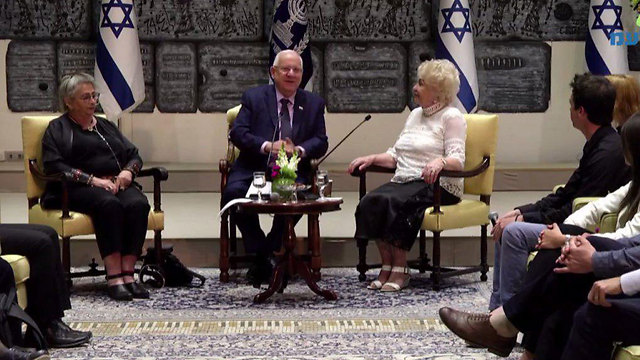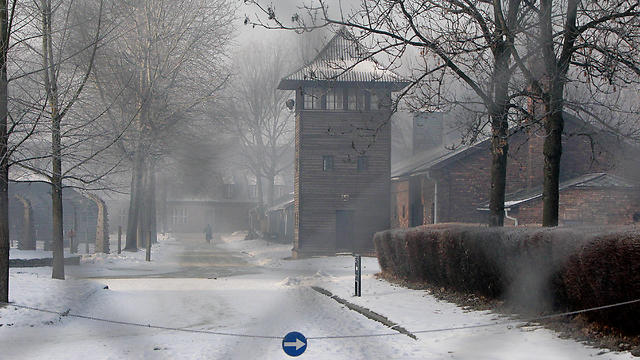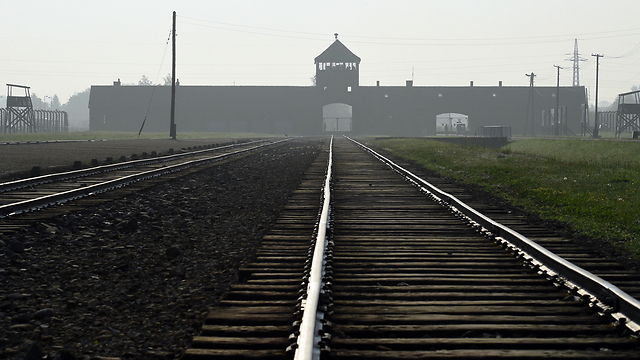‘We kept walking. After a few moments, we heard the shots’—a survivor of the Auschwitz extermination camp, who lost her entire family in the Holocaust and lived through the death marches, recounts her memories as a lonely little girl, fighting to survive the horrors of the Nazi regime.
Ahead of Holocaust Remembrance Day on Sunday, President Reuven Rivlin and his wife Nechama hosted on Thursday a Holocaust survivor for a special sit-down in memoriam of the family she lost.
In the meeting, the 87-year-old survivor Miriam Eshel told her story as a survivor of the Auschwitz extermination camp. Eshel thanked the president for the honor, though she lamented the fact that no member of her family could receive the same honor.
“Now, unfortunately, I must sadden you a bit. Stay with me, for this is our life,” she said.

Eshel then began to tell the story of how she and her family were driven from their home by the Nazis.
“Were first heard knocks on our door; ‘Raus! Raus!’ to those who don’t understand, he yelled at everyone to come out.
“I pushed against my mom for safety, but nothing helped. They barged in, grabbed us and threw us out. ‘Raus, Hund!’
“I asked, ‘My, what did he call us? Dogs?’ She stopped me, ‘Don’t talk, don’t talk.
“Then we were lead to a train, and we drove. I don’t remember for how long, but I remember that it suddenly stopped, and we got off. My grandpa and grandma were gone, my sisters were gone, and I’m just a little girl, holding on to her mom.
“And so we go. Go where? Go to Mengele.

“I didn’t know who Mengele was, but I soon found out. They brought us to him. He sat surrounded by Nazi policemen. If you don’t listen to what he says, the police helps you listen—with a club, a bayonet, whatever they had in their hands.
“The children were taken in cars to the nearby forests, where they dug pits and buried them alive. It didn’t take long for them to tell me not to worry, that I have to be strong. They told me that my mother suffers no more, she was taken care of. My whole family was.
“I hoped the day will arrive when my turn will come. Why should I keep crying? I wanted that tomorrow to come, when I won’t have to cry no more.
“I remember them bringing us soup one day, soup mixed with all sorts of stuff I didn’t recognized. I remember taking it, and noticing a finger inside. A big finger, from a hand. ‘How can I eat this?’ I cried. They told me to spill it out and keep eating.”

Eshel was then taken on the death marches. “There were places where people would throw pieces of bread through their window, but we weren’t allowed to take them,” she recounted. “If someone did, he would be shot.
“Suddenly, someone through a cart out his window. A cart fit to be driven in the snow. Two girls who their mother was old and could not walk unassisted any longer took it and started pulling her mother along. I tried to help, but after a while I could barely carry myself.
“I told them, ‘I’m sorry my dears, I’m sorry but I can’t go on any more. They looked at me exhausted, and told me, ‘Neither can we.’ Just like that, we sentenced their mother to death.
“We kept walking. After a few moments, we heard the shots.”
Passing on the memory
President Rivlin said that when he was young, “every child in Israel was aware of Holocaust. We all saw the tattoos branded on their arms. That was an unquestionable testimony of the horrors of what happened there, of the unimaginable and inhuman acts carried out by the Nazis.
“Our need today to pass our knowledge on to our children is almost immeasurable. Here, nationality meets humanity,” Rivlin said, telling Eshel, “Your story is the story of Israel and the story of its founding.”
Nechama Rivlin added. “After Miriam’s heart-wrenching testimony, I’m a little embarrassed to say what the Holocaust means to me. I think that only after (Adolf) Eichmann’s trial did you allow yourselves to speak about what happened.
“Your testimony, as important as it is for today’s youth, is in my opinion essential for every German. Worse than being shot was the dehumanization you experienced throughout.”
As reported by Ynetnews
